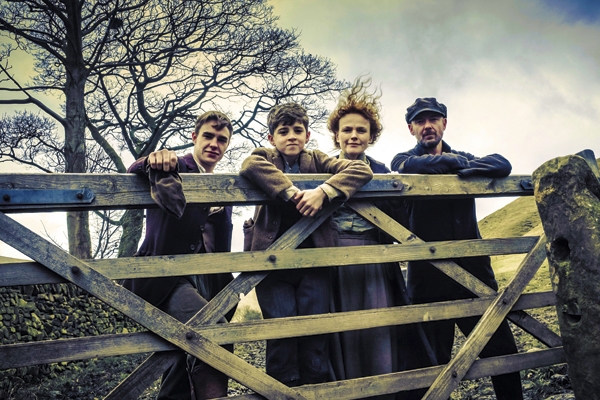Everyone’s loving BBC1’s new, Sunday-night period mega-drama The Village (32 episodes long if writer Peter Moffat has his way). It’s taut, spare, grown-up, accomplished, dark, strange and poetic, according to the critics, which I think are all euphemisms for ‘not like Downton Abbey’.
And it definitely isn’t like Downton Abbey. There’s a lot more brooding, the dialogue’s more Pinteresque (which is to say it’s more often there to evoke mood or the banality of existence than to carry the plot, amuse you or illuminate character), its view of the past (a Derbyshire village on the eve of the first world war) is much less rosy. But is this necessarily a good thing?
Personally, I’m not so sure. Say what you like about Julian Fellowes but he does understand the upper classes. Moffat, as he has demonstrated before in a series like Cambridge Spies, clearly doesn’t. The people in the Big House in his village are caricatures: stiff, affected, remote, unimaginative, reactionary — sweepings from the factory floor of every clichéd period drama you ever saw about toffs in grand houses, produced without a shred of sympathy or insight or originality.
Take the scene where the pretty, young, bolshie schoolma’am comes for dinner and quickly steers the conversation to her pet subject women’s suffrage. The chinless wonders at the table are frightfully agin, of course; as is the grande dame (Juliet Stevenson) who, belatedly, chastises the missy for broaching politics at dinner. But this is Moffat having his cake and eating it: had you actually been a bolshie schoolma’am living in 1914 — as opposed to a bien-pensant scriptwriter’s idea of how 1914 ought to have been — you would not have had the luxury of treating the local toffs to a proper dose of reforming righteousness in this way. Probably, your employment would have depended on their patronage. Even if it didn’t, you certainly couldn’t afford to ruffle feathers in so tight a village community as you’d be ostracised. Anyway, you wouldn’t have been invited to dinner in the first place.
But it’s not the anachronism or the clunkiness that I mind, so much as the politics. If you’re setting your cap at writing the British version of Heimat, then surely you’re selling your subject — and your audience and your generous budget — short if your vision of society is so obviously constrained by festering Guardianista class resentment. Moffat despises the old order so much that he cannot bring himself to get inside their heads. In a projected 32-part series, this represents a serious failing: why should I, as a licence-fee payer, be forced to subsidise yet more lefty agit-prop?
In Moffat’s defence, I suppose, you could argue that his depiction of the working classes is only marginally more favourable or less clichéd. Take his John Simm character — a failed smallholder straight out of Thomas Hardy — given to the bottle, child-beating and endless bouts of Job-like misfortune. He only has to scythe his wheat for it to turn to mildew.
Meanwhile, back home Maxine Peake, his long-suffering (is there any other kind in BBC dramas of this nature?) wife, has visions of a better world for her sons. Just like the progressive head of the village school does for his young charges: a new, bright, caring world where instead of brutally thrashing kids for writing with their left hands (like the other teacher does: the perpetually furious one with a great big label written on his cane saying ‘Oppressive Victorian Values which will soon be swept away by the Social Revolution of the First World War’), enlightened teachers will encourage their creativity by letting them run to the church gates and back before they pose for their school photo, so that, instead of looking all stupidly formal and sepia and so 1914 Daddy-O, they look, hey wow!, much more like 2014 kids at a lively, functioning, joyous, effective, inner-city comprehensive run by Fiona Millar. (Moffat would have made a good 19th-century political cartoonist: he could spend his whole time drawing bears marked ‘Russia’ and bulldogs or lions bearing the label ‘Britain’, so that even the thicker ones at the back could get the joke.)
Moffat has said his series was inspired by tales told by his ancestors about just how hard life was, way back when. The point he has missed, though, is that hard is not the same as joyless. Amazingly, astonishingly, even before the welfare state, health and safety, Empire Windrush, chicken tikka masala, feminism, the near-abolition of rigour and education in state schools transformed Britain into the vision of perfection it is today, ordinary people were still capable of snatching the odd moment of meaning, purpose and fulfilment from their otherwise spavined lives of relentless toil. One day, we might even make a 32-part series that shows this. But not so long as the BBC remains sole arbiter of our cultural dialectic.






Comments